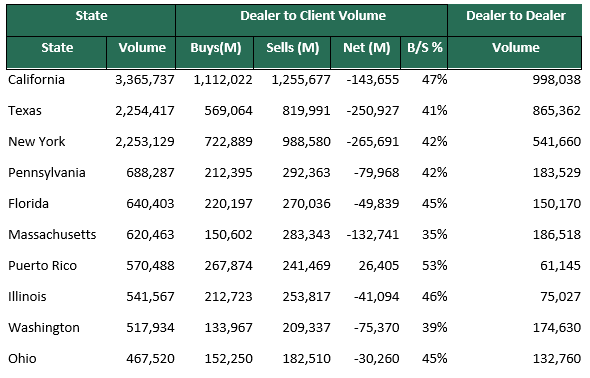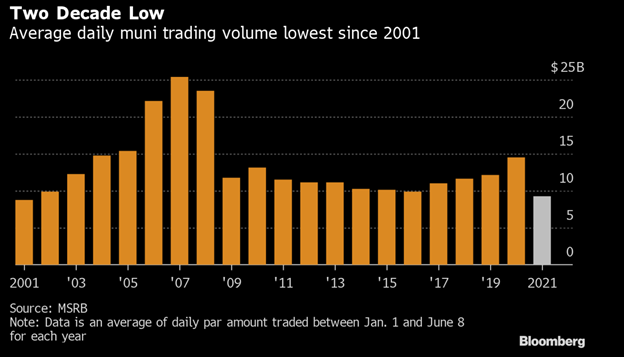Weekly Muni Snapshot | June 14 , 2021

|
Municipal New Issuance: The negotiated calendar for the first full week of June totaled approximately $7.9 billion in new issue volume. The largest deals for the week were the $466 million Tennessee Energy Acquisition Corp revenue bonds issue, followed by the $458 million Indiana Finance Authority Wastewater Utility revenue bonds. The Los Angeles Department of Water also issued $439 million revenue bonds for general system improvements. AmeriVet was a member of one negotiated issue for the week, that being the $689 million Commonwealth of Massachusetts Transportation Fund deal. With demand for new bonds being very high, most of the new issue pricings saw significant changes in lowering yields from the retail order periods up to the final institutional pricing.
Municipal Secondary Trading: Secondary trading volumes remain below historical levels with just $18.9 billion in secondary trading for the week of which 58% of the trades were Institutional clients buying for their various accounts. The bulk of the trading activity took place on Wednesday and Thursday. As with secondary trading, client bids-wanted remained light as well, according to Bloomberg clients put up just around $1.75 billion up for the bid which was down from the previous week’s volume of $2.23 billion. |
 |
|
Municipal Spread: For the first time in recent weeks we saw significant movement in lower yields in the municipal bond levels. Yields on the Bloomberg 10-year benchmark fell 8.3 basis points for the week to 0.88%. Although, we did see municipal yields fall, they underperformed compared to Treasuries as the ratios with bonds maturing in 10 years is now yielding 60.56% compared to 60.46% in the prior week. With the drop in yields across the municipal curve we did see the municipal bond curve flatten by 6.8 basis points to 137 basis points. |
 |
|
For 14th straight week investors have added to municipal bonds mutual funds and ETF’s. According to Refinitiv Lipper US Fund Flows data Investors added about $2.46 billion into those funds during the week ended Wednesday. This influx of money shows that investors are still have an appetite for tax-exempt bonds even as yields are still falling and they continue to be expensive on a relative value basis when compared to Treasuries, or alternative taxable bonds. Investors have added on average about $1.9 billion to municipal bonds each week in 2021 which is more than quadruple the average since 2010. Average daily trading for municipal bonds have hit a 16-year low, even as municipal bond fund managers continue to be with cash highlighting the difficulty, they’re having in finding both value and supply in the market. Trading in the secondary market has become very thin as many investors have held onto their bonds rather them sell them due to rates and ratios at or near their all-time lows. With President Biden’s push to raise taxes on the wealthy Investors, investors have less of an incentive to sell since they would be paying taxes on capital gains and then have to reinvest the money into lower interest rate levels. Since, the start of 2021 the average daily trading volume was about 32,500 which is the smallest daily average since 2001 according to the MSRB. |
 |
|
Municipal Supply: The negotiated calendar will finally pick up this week with roughly $9.6 billion coming to the market, up from the previous weeks calendar of $7.9 billion. The largest deal for the week and one that AmeriVet will be a syndicate member is the $1.8 billion Dormitory of the State of New York which will consist of $1.8 billion in taxable bonds and $32 million in tax-exempt bonds. The next largest issue is the $810 million Port of Seattle refunding bonds. AmeriVet will also be a syndicate member on the $493 million New York City Housing Development Corporation Multi-family revenue bonds. We should start to see a significant increase in new issue supply issuers look to take advantage of the historically low interest rate environment. The 30-day visible supply is now up to $14 billion compared to $12.3 billion we saw one month ago. |
 |
 |



